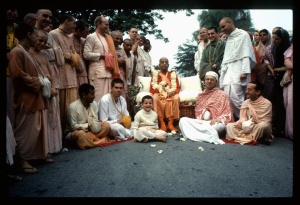CC Madhya 19.120: Difference between revisions
No edit summary |
(Vanibot #0054 edit - transform synonyms into clickable links, which search similar occurrences) |
||
| Line 19: | Line 19: | ||
<div class="synonyms"> | <div class="synonyms"> | ||
''yaḥ'' | ''[//vanipedia.org/wiki/Special:VaniSearch?s=yaḥ&tab=syno_o&ds=1 yaḥ]'' — who; ''[//vanipedia.org/wiki/Special:VaniSearch?s=prāk&tab=syno_o&ds=1 prāk] [//vanipedia.org/wiki/Special:VaniSearch?s=eva&tab=syno_o&ds=1 eva]'' — previously; ''[//vanipedia.org/wiki/Special:VaniSearch?s=priya&tab=syno_o&ds=1 priya]-[//vanipedia.org/wiki/Special:VaniSearch?s=guṇa&tab=syno_o&ds=1 guṇa]-[//vanipedia.org/wiki/Special:VaniSearch?s=gaṇaiḥ&tab=syno_o&ds=1 gaṇaiḥ]'' — by the desirable transcendental qualities of Śrī Caitanya Mahāprabhu; ''[//vanipedia.org/wiki/Special:VaniSearch?s=gāḍha&tab=syno_o&ds=1 gāḍha]'' — deeply; ''[//vanipedia.org/wiki/Special:VaniSearch?s=baddhaḥ&tab=syno_o&ds=1 baddhaḥ]'' — attached; ''[//vanipedia.org/wiki/Special:VaniSearch?s=api&tab=syno_o&ds=1 api]'' — although; ''[//vanipedia.org/wiki/Special:VaniSearch?s=muktaḥ&tab=syno_o&ds=1 muktaḥ]'' — liberated; ''[//vanipedia.org/wiki/Special:VaniSearch?s=geha&tab=syno_o&ds=1 geha]-[//vanipedia.org/wiki/Special:VaniSearch?s=adhyāsāt&tab=syno_o&ds=1 adhyāsāt]'' — from the bondage of family life; ''[//vanipedia.org/wiki/Special:VaniSearch?s=rasaḥ&tab=syno_o&ds=1 rasaḥ]'' — transcendental mellows; ''[//vanipedia.org/wiki/Special:VaniSearch?s=iva&tab=syno_o&ds=1 iva]'' — like; ''[//vanipedia.org/wiki/Special:VaniSearch?s=paraḥ&tab=syno_o&ds=1 paraḥ]'' — transcendental; ''[//vanipedia.org/wiki/Special:VaniSearch?s=mūrtaḥ&tab=syno_o&ds=1 mūrtaḥ]'' — personal form; ''[//vanipedia.org/wiki/Special:VaniSearch?s=eva&tab=syno_o&ds=1 eva]'' — certainly; ''[//vanipedia.org/wiki/Special:VaniSearch?s=api&tab=syno_o&ds=1 api]'' — although; ''[//vanipedia.org/wiki/Special:VaniSearch?s=amūrtaḥ&tab=syno_o&ds=1 amūrtaḥ]'' — without having a material form; ''[//vanipedia.org/wiki/Special:VaniSearch?s=prema&tab=syno_o&ds=1 prema]-[//vanipedia.org/wiki/Special:VaniSearch?s=ālāpaiḥ&tab=syno_o&ds=1 ālāpaiḥ]'' — by discussions of transcendental love of the Supreme; ''[//vanipedia.org/wiki/Special:VaniSearch?s=dṛḍha&tab=syno_o&ds=1 dṛḍha]-[//vanipedia.org/wiki/Special:VaniSearch?s=tara&tab=syno_o&ds=1 tara]'' — firm; ''[//vanipedia.org/wiki/Special:VaniSearch?s=pariṣvaṅga&tab=syno_o&ds=1 pariṣvaṅga]'' — of embracing; ''[//vanipedia.org/wiki/Special:VaniSearch?s=raṅgaiḥ&tab=syno_o&ds=1 raṅgaiḥ]'' — with great pleasure; ''[//vanipedia.org/wiki/Special:VaniSearch?s=prayāge&tab=syno_o&ds=1 prayāge]'' — at Prayāga; ''[//vanipedia.org/wiki/Special:VaniSearch?s=tam&tab=syno_o&ds=1 tam]'' — to him; ''[//vanipedia.org/wiki/Special:VaniSearch?s=śrī&tab=syno_o&ds=1 śrī]-[//vanipedia.org/wiki/Special:VaniSearch?s=rūpam&tab=syno_o&ds=1 rūpam]'' — Rūpa Gosvāmī; ''[//vanipedia.org/wiki/Special:VaniSearch?s=samam&tab=syno_o&ds=1 samam]'' — with; ''[//vanipedia.org/wiki/Special:VaniSearch?s=anupamena&tab=syno_o&ds=1 anupamena]'' — Anupama; ''[//vanipedia.org/wiki/Special:VaniSearch?s=anujagrāha&tab=syno_o&ds=1 anujagrāha]'' — showed mercy; ''[//vanipedia.org/wiki/Special:VaniSearch?s=devaḥ&tab=syno_o&ds=1 devaḥ]'' — the Supreme Personality of Godhead. | ||
</div> | </div> | ||
Latest revision as of 22:25, 19 February 2024

A.C. Bhaktivedanta Swami Prabhupada
TEXT 120
- yaḥ prāg eva priya-guṇa-gaṇair gāḍha-baddho ’pi mukto
- gehādhyāsād rasa iva paro mūrta evāpy amūrtaḥ
- premālāpair dṛḍhatara-pariṣvaṅga-raṅgaiḥ prayāge
- taṁ śrī-rūpaṁ samam anupamenānujagrāha devaḥ
SYNONYMS
yaḥ — who; prāk eva — previously; priya-guṇa-gaṇaiḥ — by the desirable transcendental qualities of Śrī Caitanya Mahāprabhu; gāḍha — deeply; baddhaḥ — attached; api — although; muktaḥ — liberated; geha-adhyāsāt — from the bondage of family life; rasaḥ — transcendental mellows; iva — like; paraḥ — transcendental; mūrtaḥ — personal form; eva — certainly; api — although; amūrtaḥ — without having a material form; prema-ālāpaiḥ — by discussions of transcendental love of the Supreme; dṛḍha-tara — firm; pariṣvaṅga — of embracing; raṅgaiḥ — with great pleasure; prayāge — at Prayāga; tam — to him; śrī-rūpam — Rūpa Gosvāmī; samam — with; anupamena — Anupama; anujagrāha — showed mercy; devaḥ — the Supreme Personality of Godhead.
TRANSLATION
“From the very beginning, Śrīla Rūpa Gosvāmī was deeply attracted by the transcendental qualities of Śrī Caitanya Mahāprabhu. Thus he was permanently relieved from family life. Śrīla Rūpa Gosvāmī and his younger brother, Vallabha, were blessed by Śrī Caitanya Mahāprabhu. Although the Lord was transcendentally situated in His transcendental eternal form, at Prayāga He told Rūpa Gosvāmī about transcendental ecstatic love of Kṛṣṇa. The Lord then embraced him very fondly and bestowed all His mercy upon him.”